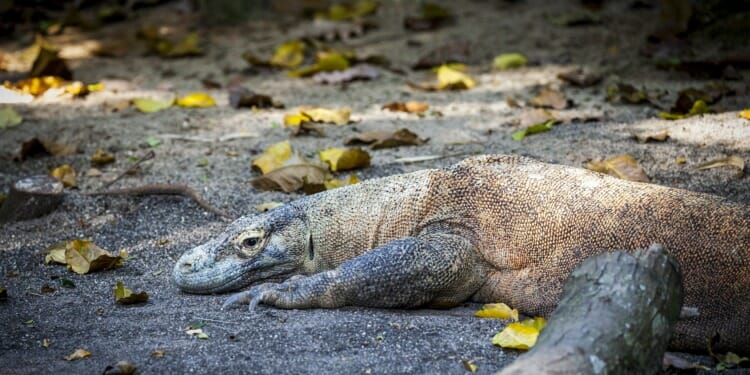The urgency of the climate crisis appears to continuously stretch across the news spectrum, from extreme weather events, to influencing politics and elections, to rising global temperatures and its consequences.
But one often forgotten aspect of climate change is now coming to the forefront of the crisis, threatening the stability of global biodiversity and providing a stark reminder to the impact of human behaviour upon the natural world — extinction.
The Komodo Dragon, a species that has potentially roamed the earth for up to four million years, has been placed on the “endangered” Red List by the International Union for the Conservation of Nature (IUCN), joining a growing list of 38,543 species at risk of extinction and serving perhaps the most alarming warning yet of the human footprint upon global ecosystems.
The #KomodoDragon has gone from “Vulnerable” to “#Endangered” on @IUCN’s Red List.
The group says sea-level rise and warming global temperatures will reduce the species’ habitat at Indonesia’s Komodo National Park by at least 45% over the next 30 years. pic.twitter.com/5rAiBIIRwQ
— Pattrn (@pattrn) September 7, 2021
The Komodo Dragon exists primarily in southern Indonesia, populating its namesake Komodo National Park as well as on the islands of Rinca and Flores. Occupying a total area of just 809 square kilometers, just over the size of New York City, the limited range of the species is being compounded by rising sea levels that, according to the IUCN, could see 71% of their natural habitat lost by 2045.
Because Komodo dragons have a very restricted geographical range, and thus a low dispersal capacity, climate change could thus negatively affect Komodo dragons
Mark Auliya, chair of the IUCN Species Survival Commission Monitor Lizard Specialist Group — VICE World News.
There are fewer than 1,400 Komodo Dragons left in the wild, and this number is expected to be cut by over a third by 2050 if the factors leading to its demise continue.
Alongside rising sea levels shrinking its already limited range, several other elements are contributing to the species’ extinction. On the island of Flores, home to over half of the Komodo Dragon population, island hunters are often competing for the same prey as the lizard, which includes pigs, deer and water buffalo.
The reptile, which can grow up to 10 feet in length and weigh over 300 pounds, is also a target for the illegal pet trade and zoos, whilst invasive species of cats, dogs and toads are believed to hunt the young lizards — an average of only 2 out of 20 survive to adulthood.
Related Articles: The World Needs to Wake Up: At Risk the Survival of Humanity | Rethinking Our Hushed Voices on Animal Endangerment and Extinction | The Climate Emergency: How Humanity Can Avoid the Fate of Dinosaurs
Numerous examples can be found of the effect that humans are having upon global biodiversity, as an ever growing number of species are placed at risk from the consequences of the climate crisis. One such case, the Bramble Cay Melomys, was a species that formerly populated islands off the coast of Australia until it was declared officially extinct in 2016.
The rodent was last spotted in 2009, and is believed to be the first mammal to go extinct due to human-created climate change after consistent flooding destroyed its ecosystem. Whilst certainly a regretful example, cases such as the Bramble Cay Melomys or the Komodo Dragon will become all too familiar without bold and drastic action to halt the effects of climate change worldwide.
“The sad reality is climate change is affecting every species,” says Dr Jeff Streicher, the Senior Curator of Amphibians and Reptiles at the Natural History Museum, adding that “dozens of species are continuing to move higher in elevation to track their preferred thermal environment, and with decreasing space, there is now competition between them.”
Environmental experts are hoping that cases like the Komodo Dragon will press the urgency of progress in climate action, particularly leading key nations to understand the importance of bolstering their climate credentials.
“The idea that these prehistoric animals have moved one step closer to extinction due in part to climate change is terrifying,” said Conservation Director at the Zoology Society of London, Dr Andrew Terry in a report by the Natural History Museum, adding that it should serve as “a further clarion call for nature to be placed at the heart of all decision making on the eve of the COP26 in Glasgow.”
The critical United Nations summit, commencing in less than 50 days, will set the stage for key nations to try and negotiate long-term climate commitments and reinforce actions such as those made at the 2015 Paris Climate Agreement.
Whilst more prominent or intimidating factors such as the global transition away from fossil fuels, or convincing key players such as China to shift their prioritisation away from economic advancement to climate necessity, may take precedence at the UN conference, one can only hope that the possible extinction of a prehistoric species due to human intervention will highlight the importance that preserving biodiversity and ecosystem stability should hold at the climate negotiations.
Editor’s Note: The opinions expressed here by Impakter.com columnists are their own, not those of Impakter.com. — In the Featured Photo: A Komodo Dragon. Featured Photo Credit: Pixabay










